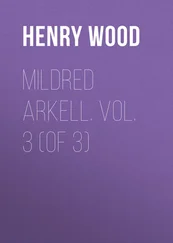Henry Wood - The Shadow of Ashlydyat
Здесь есть возможность читать онлайн «Henry Wood - The Shadow of Ashlydyat» — ознакомительный отрывок электронной книги совершенно бесплатно, а после прочтения отрывка купить полную версию. В некоторых случаях можно слушать аудио, скачать через торрент в формате fb2 и присутствует краткое содержание. Жанр: foreign_prose, literature_19, foreign_antique, на английском языке. Описание произведения, (предисловие) а так же отзывы посетителей доступны на портале библиотеки ЛибКат.
- Название:The Shadow of Ashlydyat
- Автор:
- Жанр:
- Год:неизвестен
- ISBN:нет данных
- Рейтинг книги:4 / 5. Голосов: 1
-
Избранное:Добавить в избранное
- Отзывы:
-
Ваша оценка:
- 80
- 1
- 2
- 3
- 4
- 5
The Shadow of Ashlydyat: краткое содержание, описание и аннотация
Предлагаем к чтению аннотацию, описание, краткое содержание или предисловие (зависит от того, что написал сам автор книги «The Shadow of Ashlydyat»). Если вы не нашли необходимую информацию о книге — напишите в комментариях, мы постараемся отыскать её.
The Shadow of Ashlydyat — читать онлайн ознакомительный отрывок
Ниже представлен текст книги, разбитый по страницам. Система сохранения места последней прочитанной страницы, позволяет с удобством читать онлайн бесплатно книгу «The Shadow of Ashlydyat», без необходимости каждый раз заново искать на чём Вы остановились. Поставьте закладку, и сможете в любой момент перейти на страницу, на которой закончили чтение.
Интервал:
Закладка:
“Is it going to last, David?” inquired the Rector, appearing at his wife’s side, and laughing inwardly at her diplomatic failure.
David nodded his usual salutation as he answered. He would sometimes relax so far as to say “Sir” to Mr. Hastings, an honour paid exclusively to his pastoral capacity. “No, it won’t last, sir. We shall have the warm weather back again.”
“You think so!” exclaimed the Rector in an accent of disappointment. Experience had taught him that David, in regard to the weather, was an oracle.
“I am sure so,” answered David. “The b’rometer’s going fast on to heat, too.”
“Is it?” said Mr. Hastings. “You have often told me you put no faith in the barometer.”
“No more I don’t: unless other signs answer to it,” said David. “The very best b’rometer going, is old father’s rheumatiz. There was a sharp frost last night, sir.”
“I know it,” replied Mr. Hastings. “A few nights of that and the fever will be driven away.”
“We shan’t get a few nights of it,” said David. “And the fever has broken out again.”
“What!” exclaimed Mr. Hastings. “The fever broken out again?”
“Yes,” said David.
The news fell upon the clergyman’s heart as a knell. He had fully believed the danger to have passed away, though not yet the sickness. “Are you sure it has broken out again, David?” he asked, after a pause.
“I ain’t no surer than I was told, sir,” returned phlegmatic David. “I met Cox just now, and he said, as he passed, that fever had shown itself in a fresh place.”
“Do you know where?” inquired Mr. Hastings.
“He said, I b’lieve, but I didn’t catch it. If I stopped to listen to the talk of fevers, and such-like, where would my work be?”
Taking his hat, one of the very clerical shape, with a broad brim, the Rector left his house. He was scarcely without the gates when he saw Mr. Snow, who was the most popular doctor in Prior’s Ash, coming along quickly in his gig. Mr. Hastings threw out his hand, and the groom pulled up.
“Is it true?—this fresh rumour of the fever?”
“Too true, I fear,” replied Mr. Snow. “I am on my way thither now; just summoned.”
“Who is attacked?”
“Sarah Anne Grame.”
The name appeared to startle the Rector. “Sarah Anne Grame!” he repeated. “She will never battle through it!” The doctor raised his eyebrows, as if he thought it doubtful himself, and signed to his groom to hasten on.
“Tell Lady Sarah I will call upon her in the course of the day,” called out Mr. Hastings, as the gig sped on its way. “I must ask Maria if she has heard news of this,” he continued, in soliloquy, as he turned within the Rectory gate.
Maria Hastings had found her way to the study. To dignify a room by the appellation of “study” in a clergyman’s house, would at once imply that it must be the private sanctum of its master, consecrated to his sermons and his other clerical studies. Not so, however, in the Rectory of All Souls. The study there was chiefly consecrated to litter, and the master had less to do with it, personally, than with almost any other room in the house. There, the children, boys and girls, played, or learned lessons, or practised; there, Mrs. Hastings would sit to sew when she had any work in hand too plebeian for the eyes of polite visitors.
Grace, the eldest of the family, was twenty years of age, one year older than Maria. She bore a great resemblance to her father; and, like him, was more practical than imaginative. She was very useful, in the house, and took much care off Mrs. Hastings’s hands. It happened that all the children, five of them besides Maria, were this morning at home. It was holiday that day with the boys. Isaac was next to Maria, but nearly three years younger; one had died between them; Reginald was next; Harry last; and then came a little girl, Rose. They ought to have been preparing their lessons; were supposed to be doing so by Mr. and Mrs. Hastings: in point of fact, they were gathering round Grace, who was seated on a low stool solving some amusing puzzles from a new book. They started up when Maria entered, and went dancing round her.
Maria danced too; she kissed them all; she sang aloud in her joyousness of heart. What was it that made that heart so glad, her life as a very Eden? The ever-constant presence there of George Godolphin.
“Have you come home to stay, Maria?”
“I have come home to go ,” she answered, with a laugh. “We start for Scotland on Monday, and I want to hunt up oceans of things.”
“It is fine to be you, Maria,” exclaimed Grace, with a sensation very like envy. “You have all the pleasure, and I have to stop at home and do all the work. It is not fair.”
“Gracie dear, it will be your turn next. I did not ask Lady Godolphin to invite me, instead of you. I never thought of her inviting me, being the younger of the two.”
“But she did invite you,” grumbled Grace.
“I say, Maria, you are not to go to Scotland,” struck in Isaac.
“Who says so?” cried Maria, her heart standing still, as she halted in one corner of the room with at least half a dozen arms round her.
“Mamma said yesterday she thought you were not: that papa would not have it.”
“Is that all?” and Maria’s pulses coursed on again. “I am to go: I have just been with papa and mamma. They know that I have come to get my things for the journey.”
“Maria, who goes?”
“Sir George and my lady, and I and Charlotte Pain.”
“Maria, I want to know why Charlotte Pain goes?” cried Grace.
Maria laughed. “You are like Bessy Godolphin, Grace. She asked the same question, and my lady answered, ‘Because she chose to invite her.’ I can only repeat to you the same reason.”
“Does George Godolphin go?”
“No,” replied Maria.
“Oh, doesn’t he, though!” exclaimed Reginald. “Tell that to the marines, mademoiselle.”
“He does not go with us,” said Maria. “Regy, you know you will get into hot water if you use those sea phrases.”
“Sea phrases! that is just like a girl,” retorted Reginald. “What will you lay me that George Godolphin is not in Scotland within a week after you are all there?”
“I will not lay anything,” said Maria, who in her inmost heart hoped and believed that George would be there.
“Catch him stopping away if Charlotte Pain goes?” went on Reginald. “Yesterday I was at the pastry-cook’s, having a tuck-out with that shilling old Crosse gave me, and Mr. George and Miss Charlotte came in. I heard a little.”
“What did you hear?” breathed Maria. She could not help the question: any more than she could help the wild beating of her heart at the boy’s words.
“I did not catch it all,” said Reginald. “It was about Scotland, though, and what they should do when they were there. Mrs. Verrall’s carriage came up then, and he put her into it. An out-and-out flirt is George Godolphin!”
Grace Hastings threw her keen dark eyes upon Maria. “Do not let him flirt with you ,” she said in a marked tone. “You like him; I do not. I never thought George Godolphin worth his salt.”
“That’s just Grace!” exclaimed Isaac. “Taking her likes and dislikes! and for no cause, or reason, but her own crotchets and prejudices. He is the nicest fellow going, is George Godolphin. Charlotte Pain’s is a new face and a beautiful one: let him admire it.”
“He admires rather too many,” nodded Grace.
“As long as he does not admire yours, you have no right to grumble,” rejoined Isaac provokingly: and Grace flung a bundle of work at him, for the laugh turned against her.
“Rose, you naughty child, you have my crayons there!” exclaimed Maria, happening to cast her eyes upon the table, where Rose was seated too quietly to be at anything but mischief.
Читать дальшеИнтервал:
Закладка:
Похожие книги на «The Shadow of Ashlydyat»
Представляем Вашему вниманию похожие книги на «The Shadow of Ashlydyat» списком для выбора. Мы отобрали схожую по названию и смыслу литературу в надежде предоставить читателям больше вариантов отыскать новые, интересные, ещё непрочитанные произведения.
Обсуждение, отзывы о книге «The Shadow of Ashlydyat» и просто собственные мнения читателей. Оставьте ваши комментарии, напишите, что Вы думаете о произведении, его смысле или главных героях. Укажите что конкретно понравилось, а что нет, и почему Вы так считаете.












